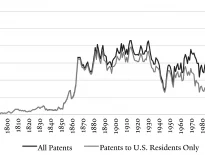
I’ve been the “Grumpy Get Off My Lawn!” about this over the years and tend to just roll with the people who are adamant that words are interchangeable, feeling that it’s not worth pushing when people want to say one thing can mean another.
Of what have I been grumpy? Words matter.
- An investor in a startup isn’t necessarily an Angel Investor
- A VC isn’t an individual investing, it’s someone who runs a fund
- And while a startup is new and hoping to become a business, a new business isn’t a startup
A Startup is Not a New Business, and a New Business isn’t a Startup
I’m cranky because this dilution of words misleads would-be entrepreneurs as people attempting startups get poor advice from business advisors and investors, while people starting businesses get misdirected by advice about startups.
I was asked today, just today, over the course of 4 separate meetings, “How much revenue do investors expect to see in a startup before they’ll invest?”
And that was just today
And thus, a great example of my grumpy attitude about this. Genuine “startup” pitches wouldn’t have many startup investors asking about revenue to such a degree.
I put startups in quotes because I find that people expecting revenue are actually working with businesses while people who work with startups, at this early stage, know too well that revenue is a red herring. A distinction between “new business” and “startup.”
Startups are temporary ventures in search of a business model. They are NOT “new businesses,” because we have to in some way distinguish what the thing is that isn’t yet a business. We call that a startup. We don’t KNOW yet who the customers are, how we’ll make money, or what that revenue potential might be.
VCs (and Angels who invest in startups) know this.
Asking me, as the founder of, say, Twitter or Google, how much money we’re going to make, and how, is an inappropriate and, frankly, ignorant question.
Hopefully, it’s obvious why… things like Twitter and Google could not know yet how they’d make money, they were inventing their model. They didn’t make money for years.
They were not “new businesses,” they were startups.
New businesses can (and should) KNOW how they’ll make money, and thus could work out to some extent how much they might make. How?? Because while new, they’re doing something other businesses have already figured out. One of those new ventures, the first one successful, *was* a startup, until they figured out how it works, they then became a business; and subsequent similar ventures are new businesses, not startups.
Uber and Lyft were startups. If you were to launch a ride-sharing app today doing that, it wouldn’t accurately be called a startup because it’s valid that we all expect you know how to make money, and how much you could make.
Why then are “Investors” asking so much about revenue in your venture?
If your reference to “startup” actually means startup, then appropriate investors would not be fixated on revenue.
Then again, were that the case, you shouldn’t get such questions because investors genuine to startups, wouldn’t be asking you.
This means one of two things:
- What you have is not really a startup, and thus you should know the revenues
- Or they’re pretty bad investors and they’re misleading you, implying they do invest in startups when clearly, they don’t.
If your startup is actually a “new business” then it’s valid they’re asking for revenue and revenue potential. Businesses and business investors make money and reasonably expect to invest with that measurable return in mind.
Startup investors seek 3 things:
- Exit potential
- Market (competition, trends, history, partners, and opportunity)
- Team capable and flexible
Notice what’s not there: customers and revenue. Because in a startup, customers and revenue can’t yet be certain, having some customers and revenue is nothing more than a signal, among many, that the startup *might* be on a right path. It’s just as likely (more so in fact) that those customers and that revenue will mislead a bit, or that competition will still put you out of business; hence startups aren’t fixated on revenue (and investors shouldn’t be).







I’ve been waiting a long time for this!
Alright, that’s all the encouragement needed, with the other comments thus far, clearly we should build this out more.
Candace Clark Megan Botha a real and relevant thread here, applicable in all we’re doing. Helping people discern the differences ?
Extremely insightful information. Thanks for posting Paul!
Thanks Rich Fortune. I think there is a book in this topic because there are so many distinctions between business and startup… If only I had the time
OMG! Someone else out there actually gets it. I couldn’t agree more Paul. Thanks for taking the time to write and publish this.
We need to start a club then Christopher Piedmonte because there are many of us, more so in the mature startup cities, and it takes a concerted effort to draw the lines in the sand so investors don’t screw up what entrepreneurs are taking the risks to accomplish
“Startup” to me could be another Vet Clinic in my neighborhood. How about using the label “entrepreneur”? It connotes the state of still hustling to find/prove a winning business model and a sustainable product fit to the market(s).
Nope. Hate to point it out my friend, but that’s precisely the dilution of words that I’m talking about; creating the confusions in people.
A Vet Clinic is an existing type of business. We can know how to start and operate such things. We can know how much money such things should make.
VCs don’t invest in Vet Clinics. Vets who hope to raise money for a Vet Clinic should *not* be seeking advice from startup advisors and Angel investors.
That’s a new business, not a startup.
–
Entrepreneur has repeatedly been distinguished not as someone who owns a business (that’s a business owner) but the personality trait of the person who seemingly out of necessity, repeatedly puts themselves at professional risk in order to improve or create something new.
Entrepreneur isn’t necessarily even Startup Founder.
Some are and some aren’t.
Elon Musk? Entrepreneur
Mark Zuckerberg? Not so much. Startup Founder
Gary Keller? Business owner
Hopefully those distinctions are clear. And mincing words to suggest that they’re all the same *type* of people (with the same risk tolerances, expectations, and drive) is misleading. They’re all successful! But not the same.
Too many startups assume they have a business model because they created one in Excel.
Stay grumpy my friend!
Frequently repeated in our incubators, “You have *a* business plan, let’s figure out at least 2 or 3 more”
Equally applies to the business model; stress the a
A startup not only has to be a business idea but also creating a new business category or making a alteration to an existing one?
Important difference. The hustle is the same
Troy Schlicker simply? Yes.
Thanks for a great article and starting an interesting debate. I want to comment on your definition however: “We don’t KNOW yet who the customers are, how we’ll make money, or what that revenue potential might be.” I feel I could use more clarity if this line so drawn in sand.
Let me try to use your examples. Uber knew rather rather well who their first customers will be, how they will make money, and the revenue potential. They had data avails from Taxi cab market. They knew the baseline, but hypothesized that they can open up a bigger market and there can be an unknown amount of risk or upside.
Now, compare that to a vet clinic local to us in Cedar Park, Texas. The vet sees goats and charges the farms a subscription to provide farm call services, instead of per-visit. Not your typical city vet by any means and the model is unique. When they started, there was no data available on how many people have goats or even want a farm vet for them. They didn’t know if subscription will work or people only want to pay per visit so they had both models. Wouldn’t this “business” meet the definition of a startup better than Uber? I would argue it’s still a business because it has proven but this model but never bothered to open a second clinic.
My point: the definition isn’t just about the amount of what’s unknown. There are many unknowns. The aspiration to go big, fast matters more than the unknowns. I can take an existing; proven model and apply it a brand new market and make it a startup – Careem did exactly this by making the Uber for Middle East. That was a startup but by any definition but knew, from Uber’s success, the answers to all three questions going in.
Just curious how you view these examples and if can add more clarity for me and others.
Stick with Uber in asking, “Let me try to use your examples.”
Did they know who their first PAYING customers would be? They did not launch to replace taxis. That was a later discovered business model.
They started as a carpool app with the fees closely associated with gas + maintenance for the use of the car by the driver. It wasn’t meant for people to make money making a living giving rides; it was for me, driving downtown, to bring 3 people with me and cover gas. More or less.
Who are the customers for that? People at that point weren’t willing to pay MORE such that Uber could make a lot of money because Ubers didn’t go many places as they do now. They looked to sponsors, advertising, offering other services, and more. It was only in time that it was apparent that people were trying to drive all the time, that with route density, people would use it as an alternative to Taxis.
Vets are a much clearer example of a business because it IS known what vet services charge. That first subscription vet service would have been a startup, proving that a subscription service would work, since that hadn’t been done, but like new ride-sharing services now, now that we know the Taxi model alternative, NEW ventures doing the same thing would just be new businesses.
The unknowns are the MARKET and yes, those will always have unknowns (this is why Marketing first is so important):
1. How many rides?
2. What rountes?
3. Competition?
4. How many goats?
5. How many farms?
Those are marketing questions.
A startup is a new MODEL: a temporary venture in search of a model. Those market questions will always still exist; but the model was NOT known:
1. Will people share carpool via app?
2. Will people pay for gas?
3. Will farms subscribe to a vet?
4. Can we replace Taxis?
The subtlety is in there.